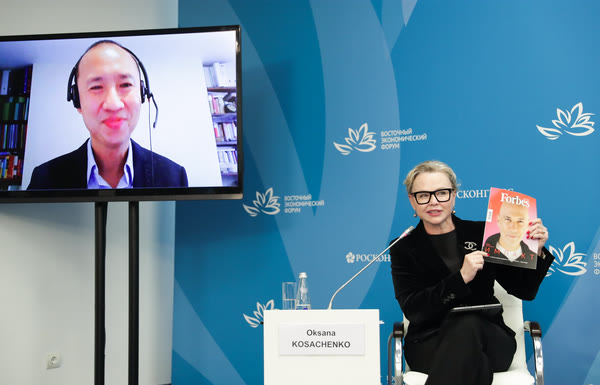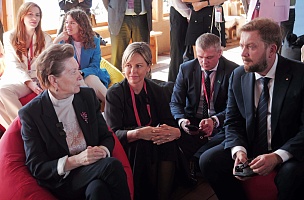KEY CONCLUSIONS
Social impact bonds (SIBs) are a well-established mechanism to increase impact investments in the Far East
“Thanks to VEB, SIBs exist on the Russian market. These are projects where the state purchases a ready-made effect precisely when the state, for some reason, has not achieved this effect on its own. Of the five SIB that have been concluded today, four have ended up in the Far East region,” Deputy Chairman and Member of the Board of VEB.RF Svetlana Yachevskaya.
“Impact investments, but SIBs, in particular, are still the future for the provision of social services for the population. In SIBs, anything can happen in the effect category, i.e., the state can pay for specific points that students will gain at the end of their studies,” Deputy Minister for the Development of the Russian Far East and Arctic Anatoly Bobrakov.
“A very good mechanism for attracting investors via the SIBs is training for experts who will evaluate the effect. Of course, this will provide an incentive to implement a project. I think that teaching everyone these skills in evaluating the effects of projects and participating in them is, of course, such a huge focus in terms of stimulating these projects,” Promsvyazbank Deputy Chairman Anton Drozdov.
PROBLEMS
Lack of a common terminology for the concept of ‘impact investment’
“A social impact bond is a project or a kind of financial instrument where the state is the customer for a number of changes, and then an investor appears. The investor may or may not be the executor. But this effect must be measurable. We need to develop a vocabulary and we need to agree on what we describe as an impact,” Sistema Charitable Foundation President Oksana Kosachenko.
“The problem with impact investment terminology is that it doesn’t refer to one single thing. It covers a whole range of issues and a wide range of things,” Traverse Ltd. Chairman Sin Chih-Hoong.
“There are name collisions all over the world, which is why we called it differently when preparing this instrument for Russian jurisdiction. Because at first we encountered the fact that the market did not understand us, and even more so the authorities did not understand us when we started talking about bonds,” Deputy Chairman and Member of the Board of VEB.RF Svetlana Yachevskaya.
Investors are afraid to invest due to the lack of established risk assessment practices
“Of course, we are dealing with the fact that private investors still don’t always trust the state since they are investing money. And it’s not known whether they will recoup this investment or not,” Promsvyazbank Deputy Chairman Anton Drozdov.
“The risk issue is, of course, a key obstacle when it comes to encouraging impact investment. Based on the UK’s experience, the Japan Development Bank prepared to use its capital to take the first blow in terms of risk. This is essential so that it can become part of a mixed structure that reduces risks for investors,” Traverse Ltd. Chairman Sin Chih-Hoong.
SOLUTIONS
The state needs to develop measures to support impact investors and banks
“Of course, we would like to have some sort of support, including for us, from development institutions. It could be methodological, it could be financial, or it could be some kind of incentive for those who will participate. The second, of course, is an experiment, and it’s clear that the methodology is being worked out as part of the experiment, but we would like to have clear approaches to calculating the social effects,” Promsvyazbank Deputy Chairman Anton Drozdov.
“Direct investment logic shouldn’t be the only thing that works in such projects. Like any public-private partnership projects, they require additional leverage from the state and additional participation, so I’d like to point out here our readiness and intention to participate with resources in our state programme to support the implementation of such projects on our territory,” Minister for the Development of the Russian Far East and Arctic Alexey Chekunkov.
Clear goal setting by the state
“We believe the main thing is to correctly define the goals. This is the state’s role. It must determine what it wants at the moment, and here the success of this project will depend on how well this goal is correctly defined,” Promsvyazbank Deputy Chairman Anton Drozdov.
“This is possibly the area of finance that requires the closest and most detailed interaction between the state and the investor. The success of social impact projects largely depends on the quality of planning, the quality of contractors, well-defined results, the clarity of the schedule, and the people who will be involved in these projects,” Minister for the Development of the Russian Far East and Arctic Alexey Chekunkov.
“The market needs to understand what the government understands by social values, and what the priorities are in terms of PPPs and the development of infrastructure projects,” Traverse Ltd. Chairman Sin Chih-Hoong.
Attract public and private banks to expand impact investment
“We can act as an operator, i.e., assess the effects and structure the platform. We can use SIBs and help simulate them. We can participate in coming up with approaches to determine quantitative and qualitative indicators because we have experts. We can initiate projects since we have a large client base, and our clients want to implement certain projects,” Promsvyazbank Deputy Chairman Anton Drozdov.
“There are just over 200 impact investment projects in the world. In order for us to expand this range of opportunities, it might be worth helping investors to invest, and for this we need to think about financing. And this raises the issue of commercial banks and the assistance that commercial banks can start to provide to social impact projects. We will probably then get some statistics and we will be able to assess the risks. Maybe investors will be less afraid and contributions to impact projects will increase,” Sistema Charitable Foundation President Oksana Kosachenko.
For more, see the Roscongress Foundation’s Information and Analytical System roscongress.org






